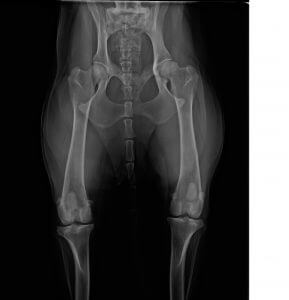OFA stands for the Orthopedic Foundation for Animals. It was founded and originally incorporated as a private not-for-profit foundation in 1966. Their mission is to “promote the health and welfare of companion animals through a reduction in the incidence of genetic disease”.
Disclaimer: The topic of breeding companion animals can be controversial. It is not the intention of this blog article to start a debate, only to educate.
Why test?
The OFA promotes responsible breeding with the goal of eliminating unwanted genetic diseases. By providing breeders with the knowledge of which of their animals has a specific condition, the hope is to encourage them not to breed that animal to avoid passing along the conditions. A patient that is “certified” is unlikely to pass on the disease and therefore can be used for breeding.
Which Conditions Are Tested For?
The name suggests that only orthopedic (related to bones) conditions can be certified, which is how the foundation began. Over time the database has grown to include many different diseases and conditions including:

- Hip dysplasia- Abnormally developed hip joints leading to arthritis, pain, and debilitation.
- Elbow dysplasia- Abnormally developed humerus and/or ulna (arm bones), or the joint that connects them.
- Luxating Patella- The groove that the patella (knee cap) sits in is not deep enough so the knee cap can luxate (dislocate).
- Shoulder Osteochondrosis (OCD)- A disturbance in the change of cartilage into the bone in the developing fetus.
- Cardiac Disease- Malformations of the heart or great vessels
- Thyroid Disease- Testing for the genetic marker that leads to one form of hypothyroidism (low thyroid hormone).
- Congenital Deafness- Inherited deafness can be caused by a gene defect. At this point, there is no test for it, but it is recorded in the OFA database.
- DNA Tests- The OFA has partnered with the University of Missouri College of Veterinary Medicine to test multiple diseases linked to genetic mutations. See the OFA website for a complete list as it may change.
- Other- The OFA is always adding other diseases and conditions, for an updated list refer to their website listed below.
Breed-specific
Collecting the data of known cases of conditions leads to knowledge of which breeds are more susceptible to them. Higher instances of these conditions can be seen in certain breeds; therefore the testing is highly recommended for that breed. On the OFA website, you can search for recommendations by breed.
Protocol
We have digital radiology at both our Bemidji and Roseau locations. Therefore we can submit radiographs to OFA via email which allows for a faster turnaround of results. For easy and efficient check-in, please follow these protocols:
- Patients must be sedated for radiographs.
- We would like patients dropped off by 8:00 AM and can be picked up in the afternoon.
- Clients must bring AKC paperwork.
- OFA radiographs shouldn’t be taken on a dog that is already pregnant or in heat.
- Dogs younger than 2 years old would have Preliminary OFA radiographs.
- Clients will need to pay the OFA fee with a credit card to submit via email.
This blog article is an overview of the Orthopedic Foundation for Animals. For more details visit their website.
What's Next
Call us or schedule an appointment online.
Meet with a doctor for an initial exam.
Put a plan together for your pet.


